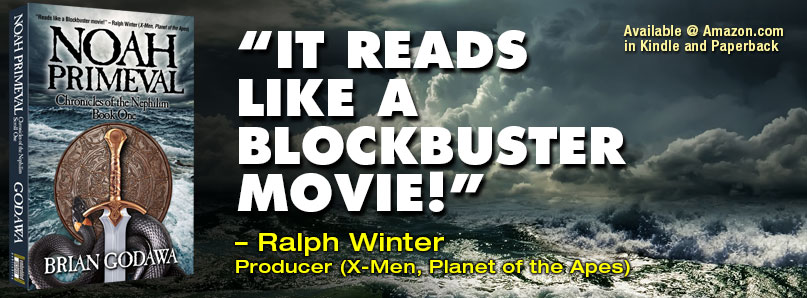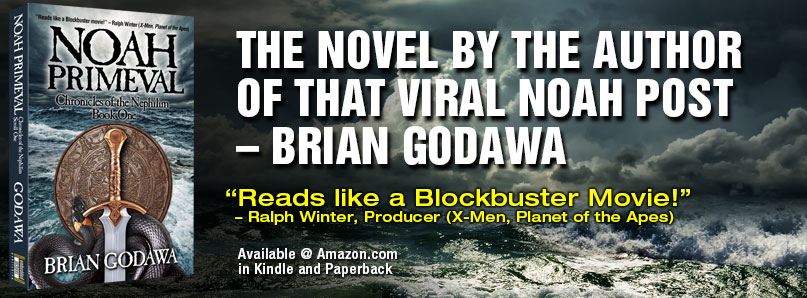The Noah movie starring Russell Crowe is raising the topic of the Flood and just why it happened. I thought I would add to the conversation.
In my last post, I explained Noah’s drunken nakedness as matriarchal incest rape by Ham of Noah’s wife.
I’ve written a Biblical fantasy novel called Noah Primeval. I’ve researched this topic extensively. Noah Primeval has been a category bestseller on Amazon for 3 years. It’s first in a series of novels called Chronicles of the Nephilim.
Buy the novel Noah Primeval, here on Amazon.com in Kindle or paperback. The website www.ChroniclesOfTheNephilim.com has tons of way cool free videos, scholarly articles about Watchers and Nephilim Giants, artwork for the series, as well as a sign-up for updates and special deals.
The Flood Was God’s Response to the Corruption of God’s Image.
Genesis 6:1-4
When man began to multiply on the face of the land and daughters were born to them, the sons of God saw that the daughters of man were attractive. And they took as their wives any they chose. Then the LORD said, “My Spirit shall not abide in man forever, for he is flesh: his days shall be 120 years.” The Nephilim were on the earth in those days, and also afterward, when the Sons of God came in to the daughters of man and they bore children to them. These were the mighty men who were of old, the men of renown.
Genesis 6 is the opening lines to the story of Noah’s flood. It talks about man reproducing upon the face of the earth and “Sons of God” taking women as wives. Their offspring were the Nephilim. But who are these Sons of God who had sex with human women?
In short, the Sons of God are angels called the Watchers.
The first two verses make a point to contrast the essential identities of the Sons of God with daughters of men. The contrast is of “God” with “men.” It doesn’t say “Sons of Seth mating with Daughters of Cain,” it doesn’t say, “Sons of kings mating with daughters of commoners,” or anything like that. It says “Sons of God mating with daughters of men.” The contrast is the heavenly with the earthly. So we are talking about mating that unites spiritual angelic beings with earthly human beings.
Strange and bizarre, yes, I know. Strange — like God separating a huge sea so Israelites could pass through, or bizarre — like a hybrid God-man resurrecting from the dead to save the world.
If anyone wonders whether the phrase Sons of God could be a metaphor for “godly men” or “divine kings,” put that to rest right away. Everywhere the phrase Sons of God is used in the Old Testament, it means angelic beings from around God’s heavenly host. (See Job 1:6; 2:1; 38:7; Psalm 82:6: 2Kings 22:19-23 – here the phrase is not used, but the concept is). You can read more about this in my novel Noah Primeval.
In fact, there are different names used interchangeably in the Bible for the Sons of God.
They are called the God’s “host of heaven” who surround his throne (1Kings 22:19)
They are called Watchers (Daniel 4:13, 17, 24)
They are called Holy Ones (Daniel 4:13, 17, 24)
They are called angels (Hebrews 2:2; Psalm 148:1-2)
They are called God’s “divine council” (Psalm 82:1)
Sometimes they are called “assembly of the holy ones” (Psalm 89:5)
They are even called “gods” at times (Psalm 82:1, 6; 89:6)
Sometimes, all these terms are used together to make the point (Psalm 89:5-8)
So the Sons of God in Genesis 6 are renegade angels, divine beings from God’s heavenly throne who came to earth and had sex with human women.
Right after these Sons of God mate with humans and the Nephilim are born, we read:
Genesis 6:5–6, 11-14
The LORD saw that the wickedness of man was great in the earth, and that every intention of the thoughts of his heart was only evil continually…Noah was a righteous man, blameless in his generation. Noah walked with God… Now the earth was corrupt in God’s sight, and the earth was filled with violence. And God saw the earth, and behold, it was corrupt, for all flesh had corrupted their way on the earth. And God said to Noah, “I have determined to make an end of all flesh, for the earth is filled with violence through them. Behold, I will destroy them with the earth.
So we see that right after these intermarriages, mankind is thoroughly evil, which is deserving of judgment in itself. But that is not all we see. We also see that all flesh is corrupt and filled with violence.
Notice “corruption” is mentioned three times, making it a very important concept for the writer. (Saying “the earth was corrupt” is not a statement about environmentalism, it is a way of saying “all people on earth.”)
Now if the writer had intended to just say that all mankind was corrupted spiritually he would have used the word for mankind (adam), but he did not. He used the word for flesh (basar) – “all flesh was corrupted” — which distinctly points to the physical body.
So there is a corruption of flesh going on by the angels mating with humans. These angels are evil corrupters.
This corruption is highlighted even more when we see that Noah is described as a “righteous man, blameless in his generation.” Now, yes, Noah walked with God and that gave him a righteousness with God. But the Hebrew word for “blameless” is the same word that everywhere else in the Old Testament is used of the physically unblemished animal for ritual sacrifice. (38 times).
God seemed to be requiring physical perfection in sacrifices that symbolized the obligation of purity for atonement. The writer is making the point that Noah’s flesh, or his genetics, was not corrupted by the tainted genetic “seed” of the Watchers (Seed of the Serpent).
So the Sons of God were mating with human women and giving birth to a corrupted bloodline called the Nephilim. This corruption was most likely these fallen angels’ attempt to defile and desecrate God’s separated creative order.
Since man was created in God’s image, they were seeking to corrupt the image of God. Nothing but capital punishment will do for such a capital crime.
But more than that, I believe they were seeking to pollute the human bloodline in order to stop the coming Messiah. Noah was uncorrupted in his flesh. And guess who came from Noah’s bloodline? Jesus, the Messiah (Luke 3:23-38).
In my novel, Noah Primeval I have the fallen Sons of God seeking out Noah to try to destroy him because he was uncorrupted by them as God’s chosen one.
How did they know about the coming Messiah? I’ll explain in the next post.
Buy the novel Noah Primeval, here on Amazon.com in Kindle or paperback. The website www.ChroniclesOfTheNephilim.com has tons of way cool free videos, scholarly articles about Watchers and Nephilim Giants, artwork for the series, as well as a sign-up for updates and special deals.






